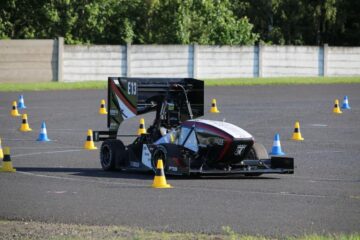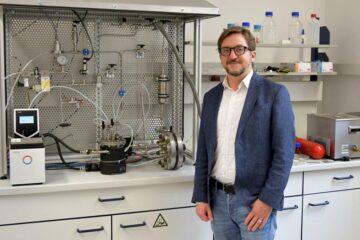Safety Of Isoflavones In Dietary Supplements Targeted By Illinois Initiative

A multidisciplinary team of scientists at the University of Illinois at Urbana-Champaign is embarking on a comprehensive five-year study of the effects of soy isoflavones found in dietary supplements on various body tissues.
At the heart of the project is the safety of phytoestrogens – estrogen-like compounds in plants that are generally thought to have driven the anti-cancer and cholesterol-lowering benefits that nutrition researchers have attributed to soy consumption in numerous studies.
The project is funded by an $8 million grant from the National Institutes of Health. Leading the effort is William G. Helferich, a professor of food science and human nutrition, whose research has shown that high levels of the isoflavone genistein promote the growth of cancerous cells in animal models representative of postmenopausal women with estrogen-dependent breast cancer.
„Under the grant, three groups will conduct preclinical investigations on animal models, looking for a balance of potential effectiveness and safety issues,“ Helferich said. „We will look at how different doses of isoflavones and the timing of exposure affect breast, brain and adipose tissues (fat). Another group will look at the mechanisms at work between isoflavones and estrogen receptors.“
While most food scientists stress the importance of consuming soy as part of a whole-foods approach, there has been a proliferation of dietary supplements and food additives containing isoflavone extracts. These products show up in food, which is regulated by the Food and Drug Administration, but some of the supplements – which contain much higher concentrations of isoflavones than are found in soy-based or supplemented food – are not regulated.
Because phytoestrogens mimic estrogen, the supplements often are marketed to women as safe alternatives to hormone-replacement therapy, which has been linked to cardiovascular problems and dementia, for battling symptoms such as hot flashes.
Initially, the researchers will focus on the biological effects of pure isoflavones, including genistein and equol. Next they will target the effects of complex mixtures of the various soy isoflavones that show up in commercially available supplements.
Scientists from four colleges – Agricultural, Consumer and Environmental Sciences; Liberal Arts and Sciences; Medicine; and Veterinary Medicine – will have leading roles. Scientists at the FDA’s National Center for Toxicology Research in Arkansas as well as at Wake Forest and Purdue universities will have supporting roles.
Helferich will continue a focus on breast cancer. He recently found that isoflavones can block the effectiveness of tamoxifen in reducing estrogen-induced tumor growth. His lab will focus on low-level chronic exposure to soy isoflavones and their influence on the progression of breast cancer from estrogen dependent to estrogen independent tumors.
Paul S. Cooke will lead a project focusing on adipose development and the potential for phytoestrogens to alter development and/or produce long-term changes in the amount and function of adipose tissue. Cooke, a professor of veterinary biosciences, previously has shown that genistein exposure causes thymic atrophy and immune dysfunction under certain conditions.
Susan L. Schantz, professor of veterinary biosciences and of psychology, and Donna L. Korol, professor of psychology, will study the effects of phytoestrogens on brain tissue and cognitive function, including cognitive flexibility, attention, inhibitory control and working memory.
John A. Katzenellenbogen, professor of chemistry, and Benita S. Katzenellenbogen, professor of molecular and integrative physiology and of cell and structural biology, will study patterns of gene activation affected by isoflavones through both estrogen-dependent and estrogen-independent receptors in breast tumors. They also will examine gene regulation in breast tumor systems, especially those adapted to changes in hormone responsiveness, adipose tissue and the brain.
Media Contact
Weitere Informationen:
http://www.uiuc.eduAlle Nachrichten aus der Kategorie: Biowissenschaften Chemie
Der innovations-report bietet im Bereich der "Life Sciences" Berichte und Artikel über Anwendungen und wissenschaftliche Erkenntnisse der modernen Biologie, der Chemie und der Humanmedizin.
Unter anderem finden Sie Wissenswertes aus den Teilbereichen: Bakteriologie, Biochemie, Bionik, Bioinformatik, Biophysik, Biotechnologie, Genetik, Geobotanik, Humanbiologie, Meeresbiologie, Mikrobiologie, Molekularbiologie, Zellbiologie, Zoologie, Bioanorganische Chemie, Mikrochemie und Umweltchemie.
Neueste Beiträge

Ideen für die Zukunft
TU Berlin präsentiert sich vom 22. bis 26. April 2024 mit neun Projekten auf der Hannover Messe 2024. Die HANNOVER MESSE gilt als die Weltleitmesse der Industrie. Ihr diesjähriger Schwerpunkt…

Peptide auf interstellarem Eis
Dass einfache Peptide auf kosmischen Staubkörnern entstehen können, wurde vom Forschungsteam um Dr. Serge Krasnokutski vom Astrophysikalischen Labor des Max-Planck-Instituts für Astronomie an der Universität Jena bereits gezeigt. Bisher ging…

Wasserstoff-Produktion in der heimischen Garage
Forschungsteam der Frankfurt UAS entwickelt Prototyp für Privathaushalte: Förderzusage vom Land Hessen für 2. Projektphase. Wasserstoff als Energieträger der Zukunft ist nicht frei verfügbar, sondern muss aufwendig hergestellt werden. Das…





















